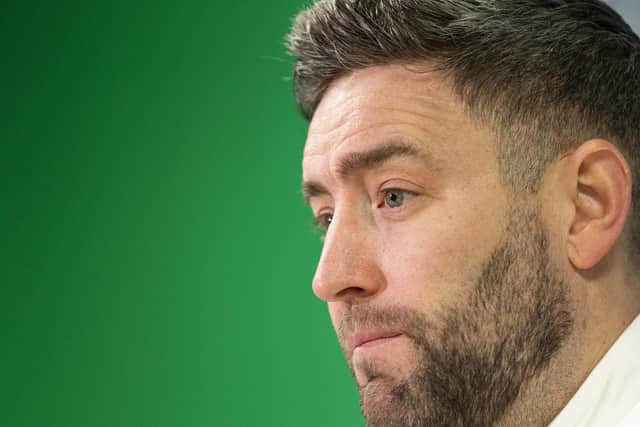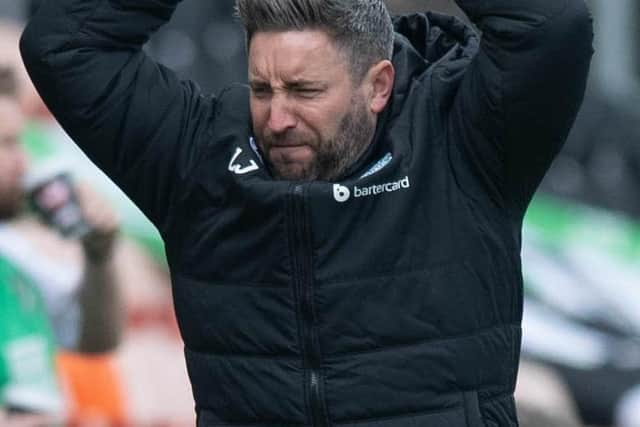Hibs boss Lee Johnson on SAS training, dealing with defeat, 24/7 job, dad and daughter
and live on Freeview channel 276
That being the case, the Hibs manager must have been through the mill a few times during his first season in charge of the Easter Road club. He has learned to deal with it through experience, however. He is still only 41, but his 500th game as a manager is fast approaching.
Johnson believes the best managers are the ones who are able to bounce back quickly from disappointing results. That is something he has been trying to do after the last two games, a home defeat by Motherwell followed by another one away to bottom-of-the-table Dundee United.
READ MORE: Hibs and hearts form compared to rivals


Advertisement
Hide AdAdvertisement
Hide AdRegular chats with his dad Gary, the current Torquay United boss, help him deal with the demands of the job. Parenting his 14-year-old daughter gives him something else important to focus on. He even tries to switch off by walking round the streets of the Capital and learning about the city’s history.
“I do try to switch off,” he reveals. “I have got a lot better at that over the years. I try to keep myself active by having interests. I love Edinburgh, I really do. I like just walking around the city. I’m big into my history as well, so I really enjoy the little factors around the place.
“But there is so much work to do. It doesn’t stop. You’d think, 'oh the transfer window is closed, so that’s recruitment stopped for a bit'. No. It’s straight onto pre-contracts, or what’s next, or players want to know about their new contracts. It’s just constantly on that conveyor belt of high red decision-making."
There is no getting away from it. Football management is a 24/7 occupation and a hazardous one at that. Robbie Neilson’s sacking as Hearts boss on Sunday is the evidence. Nobody could have predicted such a scenario in January when his Hearts team beat Hibs 3-0 twice in a month and Johnson was the one under severe pressure.


Advertisement
Hide AdAdvertisement
Hide Ad“Managers need time,” reflects the Hibs boss, known as ‘streaky Lee’ for his tendency to go through hot and cold spells. “There are bad runs, swings of confidence. What’s enough to really judge a tenure – 100 games? 150 games?. It depends on circumstances, expectation and financial outlay and clarity from the board to the fans. It’s something I’m really conscious of here.”
Post-traumatic stress
Johnson has learned to deal with losing games during his managerial career in many ways. He has previously spent time with the SAS to better understand how they deal with trauma.
“A bad loss almost becomes like a post-traumatic stress that you need to go through,” he explains. “It’s not life or death, obviously, like it would be in the military, but you feel it to that level. It is the same chemical reaction. You just come out of it quicker.
“So a lot of my work in the past was about getting through that process quicker because you almost need to go into a dark place to find out exactly and reinvent yourself in a week moving forward. And feel what everyone else is feeling.
Advertisement
Hide AdAdvertisement
Hide Ad“I think that is one of the things that great managers can do really well. They manage to take a breath, they step out every week and do their best, but are also humble enough to take it for everyone else and let them flourish.”
Johnson tries to learn lessons from his dad and speaks to him about football regularly. But he remembers only too well a different kind of pressure that comes with such a precarious profession. Not everyone is earning a fortune in football management and that places extra stress on those further down the food chain.
£50 a week
“It’s an interesting journey really because I suppose the security of the family becomes a very important part of that,” says Johnson.
“Very early on in my dad’s career, I think his contract was £50 a week as commercial manager at Cambridge United. And reserve team manager as well. So we were not a family blessed with sort of a big history of finances.
Advertisement
Hide AdAdvertisement
Hide Ad“When he then got the manager’s job at Cambridge and he used to come back after a loss, you felt it in the family. There were no one-year pay-offs back then. It was a week, then you were gone, so that’s how important it was.
“I could feel that as a kid, but, obviously, I love football, so that gives you the drive to be better and understand how important it is.
“So there are certainly elements to taking it home. It’s really important as my daughter is growing up. There are times when I haven’t got that balance right.
“I’m really close to my dad but we probably only end up chatting about football or my daughter. The conversation seems to get there very quickly whether it’s a family dinner or whatever.
Advertisement
Hide AdAdvertisement
Hide Ad“It’s a good thing, but it’s my mum as well – imagine how many games she’s watched: me growing up, my dad’s games... she’s married to football more than me or my dad.
“But it’s nice to know that you’ve always got somebody there as your backstop. They know when to leave me alone. All my family do, and they know when to lift me. I think it’s important in a job like football.”
Parenting
Johnson knows he has to be there for his family too, particularly in his role as a parent and that gives him perspective. Football is “ingrained” in him. It’s his life and he can’t see that changing, but there are other things that are more important and allow him to shift focus. “Parenting my daughter I think is the big one,” he reflects. “Nearly 15, that is a challenge.
“I’m passionate about a lot of things, but I do work hard and I do wear my heart on my sleeve and sometimes that does naturally overflow. At the same time, it’s in my blood.
Advertisement
Hide AdAdvertisement
Hide Ad“You should have seen me when I wasn’t working. I feel like I’ve been ingrained in football since my dad was a manager, coaching, and in soccer schools. It’s a blessing and a curse all in one, but I love it. I love the project.”
